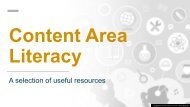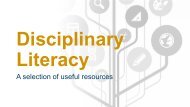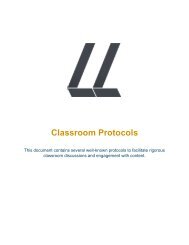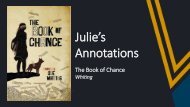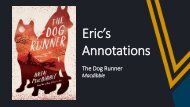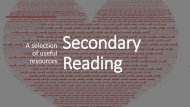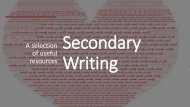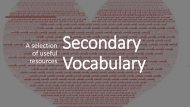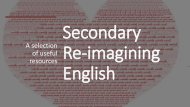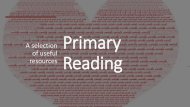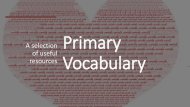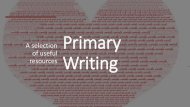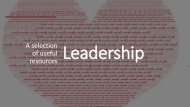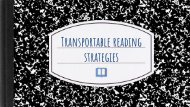Primary - Spelling Magazine 2021
Create successful ePaper yourself
Turn your PDF publications into a flip-book with our unique Google optimized e-Paper software.
A selection of<br />
useful<br />
resources<br />
<strong>Spelling</strong>
Words Their Way:<br />
Word Study for Phonics, Vocabulary<br />
and <strong>Spelling</strong> Instruction<br />
Bear, Invernizzi, Templeton & Johnston (2020)<br />
Words Their Way is a hands-on, developmentally-driven<br />
approach to word study that illustrates how to integrate and<br />
teach children phonics, vocabulary, and spelling skills.<br />
The new sixth edition offers a collection of classroom activities<br />
sequenced to help students build the skills they need to move<br />
on to the next developmental stage.<br />
New classroom footage shows teachers using word study at all<br />
stages of development.<br />
A Create Your Own feature allows teachers to modify and<br />
create sorts specific to the needs of their students. Assessment<br />
Tools included show teachers how to monitor students’<br />
progress throughout the year.
Letter Lessons and First Words:<br />
Phonics Foundations That Work<br />
Mesmer (2019)<br />
The book Letter Lessons and First Words: Phonics Foundations That<br />
Work provides a research-based vision of what engaging<br />
differentiated, sequential and explicit phonics instruction can look<br />
like.<br />
Mesmer provides basic information about how the English system<br />
of writing works which is vital knowledge if teachers are going to be<br />
effective in their teaching.<br />
A clear scops and sequence of what to teach, and a quick<br />
assessment that enables teachers to place students in the<br />
appropriate unit of instruction is included.<br />
Videos show students working with letters, words, and books at<br />
various stages of their learning.
Guiding Thinking for<br />
Effective <strong>Spelling</strong><br />
Topfer & Arendt (2017)<br />
Guiding Thinking For Effective <strong>Spelling</strong> (2 nd Edition) explains<br />
practical ways to assess students’ spelling needs and implement a<br />
consistent, supportive spelling approach across the school at all<br />
primary levels.<br />
Author’s Topfer & Arenft base their book on modern research into<br />
spelling and effective teaching.<br />
Chapters include:<br />
• ideas for developing a word conscious classroom<br />
• guiding students’ strategic thinking about spelling<br />
• actively recording students’ learning through the use of<br />
Word Study Notebooks.
<strong>Spelling</strong> It Out: How Words<br />
Work & How To Teach Them<br />
Adoniou (2016)<br />
<strong>Spelling</strong> it Out is based on Misty Adoniou’s extensive research<br />
into spelling learning and instruction.<br />
Adoniou explains how English spelling is not just random, but<br />
is a system based on meaning and a fascinating history of<br />
words in English.<br />
She encourages teachers and students to cultivate a curiosity<br />
about words, discover their history and build an<br />
understanding behind the way they are spelled.<br />
This text is based on the belief that good spelling is the result<br />
of good teaching.
Effective <strong>Spelling</strong>:<br />
Teaching Guide<br />
Topfer, Warren & Woolnough<br />
The Effective <strong>Spelling</strong> suite of resources for Foundation to<br />
Year 6 expand on the approach to the teaching of spelling<br />
outlined in Guiding Thinking For Effective <strong>Spelling</strong> (2 nd<br />
Edition). It is designed to support teachers develop effective,<br />
competent spellers who are curious about words.<br />
The authors present an inquiry approach and provide a<br />
structure for a learning sequence based on the gradual<br />
release of responsibly.<br />
The following five key spelling strategies are explored –<br />
Sound, Visual, Meaning, Connecting and Checking.
<strong>Spelling</strong> K-8:<br />
Planning and Teaching<br />
Snowball & Bolton (1999)<br />
This book by Diane Snowball & Faye Bolton shows how schools can<br />
put systematic teaching in place without compromising the<br />
principles of constructivist learning. <strong>Spelling</strong> K-8 assists teachers<br />
with:<br />
• understanding current beliefs about teaching and learning<br />
and means of translating these into classroom practice<br />
• implementing specific types of spelling investigations by<br />
clearly outlining the general process involved in spelling<br />
explorations<br />
• identifying possible spelling focuses at each grade level<br />
• relating the teaching of spelling to reading and writing<br />
experiences in a variety of curriculum areas<br />
• knowing the generalisations children need to learn to<br />
enable them to understand how written English works.
No More Phonics and <strong>Spelling</strong><br />
Worksheets<br />
Palmer & Invernizzi (2015)<br />
Palmer & Invernizzi present teaching practices that do not<br />
rely on or use one-size-fits-all approach.<br />
The book digs into:<br />
• assessment of word knowledge<br />
• differentiation<br />
• myths about English spelling<br />
• critical practices for word study<br />
• links between spelling and vocabulary<br />
• deep engagement with words.
Word Study That Sticks:<br />
Best Practices K-6<br />
Koutrakos (2018)<br />
This hands-on guide to word study instruction provides<br />
Grades K- 6 engaging and easily implemented approaches<br />
for making phonemic awareness, phonics, spelling, and<br />
vocabulary instruction come alive in any classroom.<br />
Word Study That Sticks connects research with experience<br />
and offers practical and innovative lessons to introduce new<br />
vocabulary.<br />
Koutrakos has pulled together the most popular and<br />
effective word study techniques while also emphasising the<br />
importance of student choice, engagement, and<br />
collaboration.
The Science of <strong>Spelling</strong><br />
Gentry (2004)<br />
Richard Gentry breaks down preconceptions and misconceptions<br />
about how kids learn to spell, making new connections between<br />
orthography and literacy.<br />
Underpinned by his research, he offers techniques and insights that<br />
will support lesson planning, including ways to:<br />
• identify, through spelling, what level of emergent writing a<br />
student has attained<br />
• use scaffolding, hand and finger spelling, letter boxes, and<br />
other instructional devices appropriately<br />
• manage word lists and word sorts<br />
• differentiate spelling instruction and assessment<br />
• evaluate spelling books and find alternatives to traditional<br />
spelling resources<br />
• teach phonemic awareness and phonics through spelling.
Reading the Evidence: Synthetic<br />
Phonics and Literacy Learning<br />
Clark OBE (2017)<br />
This book focuses on the impact of politics on<br />
literacy policy and practice.<br />
The authors claim that ideology is trumping the<br />
evidence so that synthetic phonics adherents are<br />
ignoring the research and the successes of the<br />
teaching in many classrooms.<br />
There are four contributors from the United<br />
Kingdom and three from Australia.
Words Their Way:<br />
Word Study for Phonics, Vocabulary<br />
and <strong>Spelling</strong> Instruction<br />
Offers a systematic, teacher-directed, childcentered<br />
plan that provides a complete<br />
word study curriculum to motivate and<br />
engage students while helping them to<br />
succeed in literacy learning.<br />
Bear, Invernizzi, Templeton & Johnston (2020)
Closing the Vocabulary Gap:<br />
Mind the Gap<br />
Quigley explores the increased demands of<br />
an academic curriculum and how closing<br />
the vocabulary gap between ‘word poor’<br />
and ‘word rich’ students could prove the<br />
vital difference between school failure and<br />
success. This book provides practical<br />
solutions for teachers across the<br />
curriculum, incorporating easy-to-use tools,<br />
resources and classroom activities.<br />
Quigley (2018)




